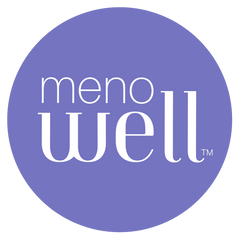How Much Protein Do You Really Need in Menopause? Here’s the Simple Formula

As women go through perimenopause and menopause, many things change in their bodies—from hormone levels to muscle mass to energy. One thing that becomes even more important during this time? Getting enough protein every day.
But how much protein do you actually need? And why is it so important during menopause?
In this guide, we’ll break it down in simple terms and give you practical tips on how to figure out the exact amount of protein that’s right for you. Along the way, we’ll also introduce you to one of our favorite go-to protein sources: MenoWell Fiber + Protein Bars.
Why Protein Matters More in Midlife
Protein is a major building block for your muscles, skin, hair, and even your hormones. During menopause, a drop in estrogen can lead to a loss of muscle mass, slower metabolism, and changes in body composition (like gaining belly fat).
Eating enough protein can help counteract these changes by:
-
Helping maintain and build muscle
-
Supporting your metabolism
-
Keeping you full longer (which helps with cravings)
-
Supporting blood sugar balance
That’s why getting enough protein is especially important during this stage of life.
How Much Protein Do You Actually Need?
Here’s the tricky part: the "standard" recommended daily allowance (RDA) for protein is 0.36 grams per pound of body weight. But research suggests this might be too low for midlife women who are experiencing muscle loss and hormonal changes.
Experts now often recommend:
0.5 to 0.7 grams of protein per pound of body weight for women 40+
Let’s do the math.
Example: If you weigh 150 pounds:
-
Low end: 150 x 0.5 = 75 grams/day
-
High end: 150 x 0.7 = 105 grams/day
So a woman who weighs 150 pounds should aim for 75 to 105 grams of protein a day to help support her muscles, energy, and overall health in menopause.
Special note: New studies are showing that as we age and lose muscle mass faster, we need even more protein, so focusing on a minimum of 100g per day is a more protective approach.
How to Hit Your Protein Target Without Getting Overwhelmed
Trying to eat 75-100 grams of protein can feel like a lot. But when you break it down into meals and snacks, it’s more doable than you think.
Here’s what it might look like in a day:
-
Breakfast: 2 eggs + Greek yogurt = 20g
-
Lunch: Chicken salad wrap = 25g
-
Snack: MenoWell Fiber + Protein Bar = 8g
-
Dinner: Salmon + quinoa = 30g
Total = 83 grams of protein
See? Not so hard!
The key is to include a source of protein at every meal and snack.
Plant-Based vs. Animal Protein: Does It Matter?
Not all protein has to come from animal sources. In fact, plant-based protein can be easier to digest and better for hormone balance. Foods like beans, lentils, tofu, nuts, seeds, and plant-based protein powders are great options.
MenoWell Bars are a great example of this. They use plant protein from sources like peas and nuts, and they’re gluten-free and dairy-free.
What Happens When You Don’t Get Enough Protein?
If you’re not getting enough protein during menopause, you might notice:
-
Feeling tired or sluggish
-
Losing strength
-
More cravings, especially for sugar
-
Difficulty losing weight
-
Feeling hungry soon after meals
Your body needs protein to function well—especially when hormones are in flux.
CHECK FOR DISCOUNTS AND SHOP ON AMAZON
An Easy Protein Boost: MenoWell Fiber + Protein Bars
Getting enough protein every day can be a challenge—especially when you're on the go, skipping meals, or just not in the mood to cook.
That’s where MenoWell Fiber + Protein Bars come in.
Each bar is packed with 7-8 grams of clean, plant-based protein along with:
-
Organic maca to support hormone health and blood sugar balance
-
Probiotic fiber to help you feel full and satisfied
-
MCT oil from coconuts to fuel your brain
-
Flaxseed, spinach, kale, and dates for added nutrients and flavor
At just 150-160 calories and 0-3g of added sugar, they make the perfect:
-
Morning break-fast (especially if you intermittent fast)
-
Mid-morning or afternoon snack
-
Post-workout protein boost
They're easy to toss in your bag, keep at your desk, or stash in your pantry.
Doctor approved. Nutritionist loved. And designed specifically for women in menopause.
Quick Tips to Up Your Protein Intake Today
-
Add Greek yogurt or cottage cheese to breakfast
-
Include beans or lentils in your lunch bowls
-
Snack on a MenoWell Bar or handful of almonds
-
Add tofu or tempeh to your stir fry
-
Choose protein-rich grains like quinoa over white rice
You don’t have to make big changes all at once. Start small and aim for protein with every meal and snack.
The Bottom Line
Your body’s protein needs increase in menopause, and eating more of it can help you stay strong, full of energy, and better able to manage changes in weight and cravings.
Aim for 0.5 to 1 grams per pound of body weight, and make protein a daily habit.
MenoWell Fiber + Protein Bars make it easier, tastier, and more convenient than ever.
CHECK FOR DISCOUNTS AND SHOP ON AMAZON
Sources:
-
Traylor, D. A., et al. (2022). "Protein requirements and optimal intakes in aging: Are we ready to recommend more protein?" Nutrients.
-
Phillips, S. M., & Fulgoni, V. L. (2016). "Assessment of the protein content and quality of plant-based foods." Food Science and Nutrition.
-
Leidy, H. J., et al. (2015). "The role of protein in weight loss and maintenance." American Journal of Clinical Nutrition.






